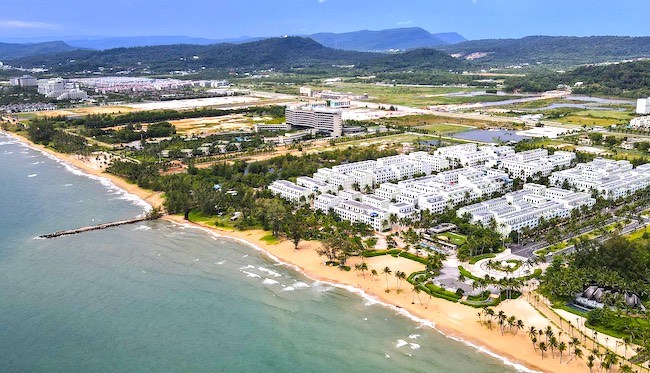When organic becomes an inspiring wellbeing lifestyle
For Tyna Huynh, co-founder of Drinkizz, organic is not just a food choice but a way of life that fosters a deep connection between people, nature and community.




Mauro Gasparotti, director of Savills Hotels points out problems Phu Quoc is facing and how to develop the island in a sustainable way.
With the average occupancy rate of 30 per cent in the first eight months of this year, do you think that Phu Quoc is facing a crisis of hotel oversupply?
Mauro Gasparotti: The low occupancy rate this year can be attributed to various factors, including the recent opening of a few hotels still establishing their presence in the market and a decline in arrivals from key international markets such as Russia and China.
Additionally, the surge in domestic travel within Vietnam, which boosted Phu Quoc's tourism in 2022 when pandemic restrictions were eased, has now shifted to other destinations, impacting Phu Quoc's visitor numbers.
Moreover, the increased costs of local flights have deterred families from choosing Phu Quoc as their holiday destination.
Looking ahead, in the long term, Phu Quoc faces a challenge in establishing a distinct identity as an international destination.
Despite the presence of high-quality new resorts, the island lacks certain elements that make it a compelling choice for travellers, such as a rich cultural experience and diverse entertainment options readily available in destinations like Bali or Koh Samui. Strategic planning steps are essential to shape the future of the island's tourism industry.

What are the main reasons for the slow recovery of Phu Quoc’s hotel market compared to other tourist destinations in Vietnam?
Mauro Gasparotti: The rapid growth in tourism has spurred the expansion of hospitality real estate in Phu Quoc. However, this growth has come with challenges.
Many developers hurriedly entered the market without careful planning, resulting in properties that does not align with market trends, the island's heritage, or have its unique identity.
Despite the presence of high-quality developments, Phu Quoc lacks central attractions, diminishing its overall appeal. Concerns have arisen due to oversupply, particularly in shophouses, leading to numerous unoccupied commercial spaces that dampen the island's vibrancy and create a sense of neglect.
Improved accessibility and expanded flight routes since late 2012 have boosted tourism and hotel development. Currently, Phu Quoc offers 25,000 accommodation units, mainly small, locally operated properties. Among them, 15 per cent are upper upscale and luxury hotels and resorts.
One of Phu Quoc's competitive advantages is its international visa policies. Unlike many other destinations in Vietnam, Phu Quoc allows travellers from all countries to enter without a visa, provided the island is their sole destination.
While this policy gives the island an edge in attracting international visitors, limited international routes and flights remain barriers, preventing Phu Quoc from fully realizing its potential. Addressing these challenges through strategic planning and investment is crucial to unlocking Phu Quoc's full allure and economic potential.
Some developers have recently asked the local government to halt licensing new hotel projects in Phu Quoc in order to absorb current hotel room supply. Do you think this request is rational or developers should take the initiative in ceasing construction of new hotels or shophouses?
Mauro Gasparotti: No, I think the problem does not lie in the overdevelopment of the island; rather, it stems from the development of the wrong products.
Besides some well-built and well-positioned resorts, there are several products that emphasize quantity over quality. Modern guests value experiences much more than in the past, and travellers, including locals, now have numerous options to explore.
Many developers hurriedly entered the market without careful planning, resulting in properties that does not align with market trends, the island's heritage, or have its unique identity.
Therefore, developers should pay careful attention to enhancing guest experiences, such as services, facilities, F&B offerings, landscaping, entertainment, sustainability, nature, wellness elements, arts, and culture, to ensure the success of a resort or a destination.
In several projects, too much focus has been placed on replicating units to achieve high room numbers, with little regard for other essential aspects. Phu Quoc authorities should allocate ample space for developing quality products, improving infrastructure, preserving local culture and sustainability, and fostering local communities as key elements for the island's future.
Do you think that Phu Quoc can build up its appeal to become a competitor to Phuket and Bali? What can differentiate Phu Quoc from Phuket and Bali in terms of tourism attractiveness?
Mauro Gasparotti: Yes, it does possess promising elements for success, but achieving it will necessitate a well-implemented, long-term plan to establish itself as an international destination with a distinctive identity.
Bali and Phuket both have unique characteristics, and it took them a considerable amount of time to develop into what they are today. Phu Quoc should not directly compete with them; instead, it should seek its own charm and development direction as a compelling holiday alternative.
Why has the number of international tourists to Phu Quoc remained modest compared to Bali and Phuket?
Mauro Gasparotti: Phuket and Bali have firmly established themselves as top tourist destinations, offering diverse experiences and comprehensive tourism infrastructure. These islands provide accommodations ranging from budget rooms and hostels to luxurious resorts and private villas, catering to various budgets and preferences due to their excellent international connectivity.
Connectivity plays a pivotal role in the development of international destinations, and this remains a significant challenge for Phu Quoc. Frequent and affordable flights enhance the appeal of a destination, and in this regard, both Phuket and Bali have excelled.
They enjoy excellent international connectivity with frequent and direct flights from major cities such as Singapore, Shanghai, and Hong Kong. This high level of connectivity makes them convenient choices for foreign tourists.
Moreover, Phuket and Bali have strong connections with local transport hubs. Phuket operates 300-320 flights per week to Bangkok, and Bali boasts 400-500 flights per week to Jakarta.
In contrast, Phu Quoc has approximately 100-150 flights to Ho Chi Minh City and 50-100 flights to Ha Noi per week, varying based on seasonal factors. The frequency of flights is directly linked to affordability, a crucial factor in attracting more visitors.

While Phu Quoc has long been touted as the Pearl Island of Vietnam, there have been almost no foreign-invested hotel projects on the island so far. Why have foreign investors stayed aloof from Phu Quoc?
Mauro Gasparotti: Currently, the hospitality market in Vietnam sees limited participation from foreign investors. Local developers have predominantly led the industry in recent years, benefiting from accessible financing and expertise in local construction, as well as expedited approval processes.
Looking ahead, the market dynamics could shift if procedures for foreign investors are streamlined, potentially paving the way for more joint ventures with local landowners.
What can be done to improve the current poor performance of hotels in Phu Quoc?
Mauro Gasparotti: Phu Quoc possesses significant potential for MICE business, sporting events, and weddings. The island offers diverse convention facilities, accommodations, and entertainment options, catering to a wide range of clients.
However, to enhance and sustain growth in these sectors, it is vital to focus on improving flight connectivity, ensuring competitive pricing and investing in infrastructure development.
Phu Quoc requires stronger links with both local and international transport hubs, such as Singapore, a crucial transportation hub in Asia. Enhanced connectivity will significantly improve Phu Quoc's accessibility, positioning it competitively against destinations like Phuket and Bali.
Despite new projects, the island lacks centralized coordination, hindering sustainable growth. Challenges include inadequate infrastructure, an oversupply of shophouses, unoccupied commercial spaces affecting vibrancy, airport expansion hurdles and insufficient social amenities.
Phu Quoc's comparative disadvantage stems from limited destination marketing. A revised development plan emphasizing coordination, sustainability, and involving both public and private sectors is imperative. Collaborative efforts and revitalization initiatives are necessary to preserve its natural appeal.
For Tyna Huynh, co-founder of Drinkizz, organic is not just a food choice but a way of life that fosters a deep connection between people, nature and community.
Embracing respectful workplaces could very well be the key to unlocking a more prosperous future for Vietnam's garment industry.
Vietnamese businesses have had a long journey with great achievements, and this path will continue and blossom in years to come.
While some jobs are expected to be replaced by emerging AI applications, the technology is broadly seen as a catalyst for positive transformation in the workforce.
The energy transition is bringing forth new challenges, particularly in refining financial systems.
Alex Hambly talks about investment opportunities in Vietnam following his appointment as chief investment officer (CIO) of VinaCapital.